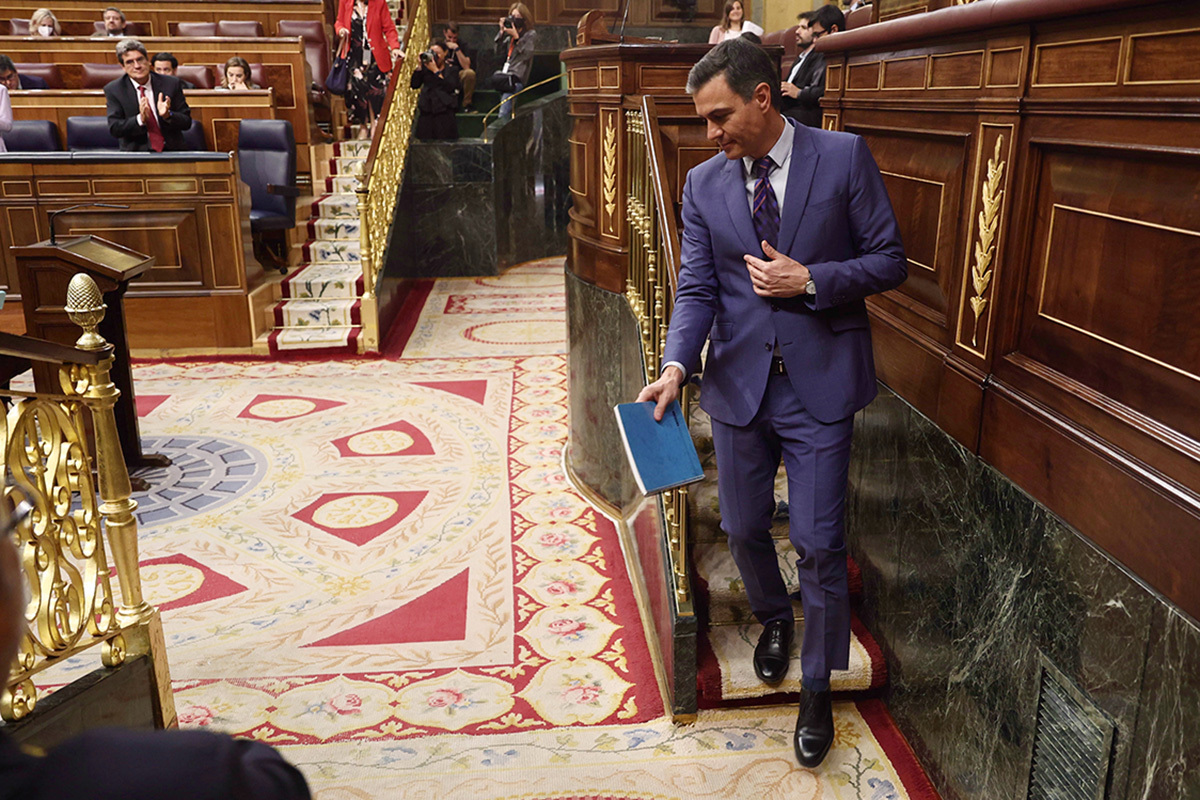“The government neither knows nor decides on the operational decisions of the intelligence services, which are always submitted to whoever has the final decision, which is the judicial authority (…) This could have happened at other times and with another government ( …) The information that affects national security is always subject to the control of the courts but is not subject to the discretionary decision of the Presidency of the Government,” President Pedro Sánchez said yesterday in the Congress of Deputies when he intervened to give explanations for the espionage carried out on the independence leaders with the Israeli Pegasus software.
However, different legal sources consulted by EL MUNDO explain that the control of the Supreme Court over the investigations carried out by the National Intelligence Center (CNI) is so limited, its intervention is so punctual, that it is daring to want to attribute to the two magistrates appointed to authorize their eavesdropping the ultimate responsibility for espionage on the Catalan pro-independence leaders. The CNI reports the development and results of its investigations to the Executive and “never” to the High Court, with the real “control of the investigations corresponding to the Government.”
Law 11/2002 regulating the National Intelligence Center establishes in articles 1, 2 and 3 that the function of the CNI is to protect national interests in order to avoid any danger to the State, reporting its investigations to the President of the Government and always respecting the submission to the legal system. In other words, the CNI does not investigate the commission of crimes, “but is dedicated to obtaining information aimed at preserving national security and reports it to the Government.”
For its part, through the Intelligence Directive, which is secret, the Executive designs and approves each year what the main objectives of our espionage service are in such a way that, when secret agents request authorization from the TS magistrates Regarding certain judicial intervention, the task of the togados is limited exclusively to analyzing those “existential questions” listed by the Executive with the aim of preventing threats to the State. However, the CNI does not inform the court about the development of its investigations. Nor about their results.
Sources from the High Court explain that the control magistrates, currently the magistrate of the Contentious-Administrative Chamber Pablo Lucas and the magistrate of the Criminal Chamber Andrés Martínez Arrieta, are limited to authorizing or denying the telephone interventions requested. the CNI applying the Intelligence Directive, approved annually, and where the President of the Government himself defines the main challenges facing the country in terms of security.
It is not in vain that there are many actions carried out by the espionage service that are adopted without the approval of the control magistrate of the High Court because their placet is not necessary. In fact, the two judges of the Supreme Court only intervene in cases in which the CNI investigations entail interference in the fundamental rights recognized in article 18.2 and 18.3 of the Spanish Constitution, that is, on the inviolability of the home and the intervention of communications.
To do this, the judges entrusted with this task exclusively assess the “proportionality” of the requested measures, their “necessity” and “specialty” in relation to the objectives set by the Intelligence Directive. Its function is similar to that performed by a guarantee judge. If the telephone intervention is urgent, the Supreme Court’s control magistrate has 24 hours to approve it. If it is not urgent, you have up to 72 hours.
In addition, these telephone punctures can be authorized for a maximum period of three months. Only in the event that the CNI wants to extend these communications interventions for longer, the intelligence service informs the judge of the result of the wiretaps, since the magistrate must be able to assess the usefulness of the interference in the fundamental right of the spied before agreeing to the extension. The legal sources consulted explain that it is the only time that the espionage service partially informs the Supreme Court magistrate about the development of its investigation.
On the other hand, the different informant sources explain that, on occasions, telephone interventions are authorized after a first request while, on other occasions, more information is requested from the espionage service or they are simply denied on the grounds that they are not provided.
In addition, court sources consulted underline that the task currently carried out by magistrates Lucas and Martínez Arrieta is carried out under the premise of absolute discretion. They work side by side but with the greatest of reservations.
Hence, the astonishment and perplexity generated in the High Court when it transpired that the former director of the CNI, Paz Esteban, was going to exhibit the cars where the espionage of the Catalan independence leaders was authorized. “In 20 years of validity of the Law regulating the CNI, full resolutions have never been shown in the Official Secrets Commission of the Congress of Deputies. The proceedings are classified and secret matter. At some time had a resolution been declassified when it had been requested by some judge in the course of an investigation, but nothing more. The credibility of the CNI is at stake,” they conclude.
Conforms to The Trust Project criteria
















